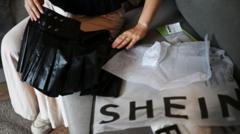Forever 21 has announced the commencement of its bankruptcy proceedings, highlighting challenges in the retail market and a shifting consumer landscape that threatens its existence.
Forever 21 Enters Bankruptcy Process: A New Chapter for the Fast-Fashion Retailer

Forever 21 Enters Bankruptcy Process: A New Chapter for the Fast-Fashion Retailer
Forever 21, once a leading name in fast-fashion, faces a significant turning point as it files for bankruptcy protection in the US.
Forever 21, the iconic fast-fashion retailer, is navigating turbulent waters as its operating company has filed for bankruptcy protection in the United States. In an official statement, the company confirmed that both its physical stores and online platform will remain operational while it initiates a phase of winding down.
Once a go-to destination for trendy and affordable apparel primarily among young women, Forever 21 has struggled recently due to stiff competition from international fast-fashion brands and the rising costs that have deterred its core consumer base. Brad Sell, the company’s chief financial officer, commented on the difficulties faced, acknowledging, “We have been unable to find a sustainable path forward, given competition from foreign fast-fashion companies... as well as rising costs, economic challenges impacting our core customers.”
Previously, Forever 21 filed for bankruptcy in 2019, only to be rescued by a consortium of investors who participated in a joint venture. In light of the current situation, the firm has announced plans for liquidation sales at its stores while considering how to oversee the sale of its assets under court supervision. The company's latest statement suggests the possibility of an alternative to a complete shutdown, emphasizing that a successful sale could pave the way for continued operations.
Filing for Chapter 11 bankruptcy allows a company to delay its obligations to creditors, offering the much-needed time to reorganize its debts or divest portions of its business. Notably, Forever 21’s international operations, managed by different license-holders, remain unaffected by this proceeding.
Founded in Los Angeles in 1984 by South Korean immigrants, Forever 21 rapidly ascended to popularity throughout the decades, rivaling giants like Zara and H&M at its peak in 2016, when the brand boasted 800 stores globally—500 of those within the United States. As the retailer embarks on this new chapter, the future of the Forever 21 brand hangs in the balance.





















